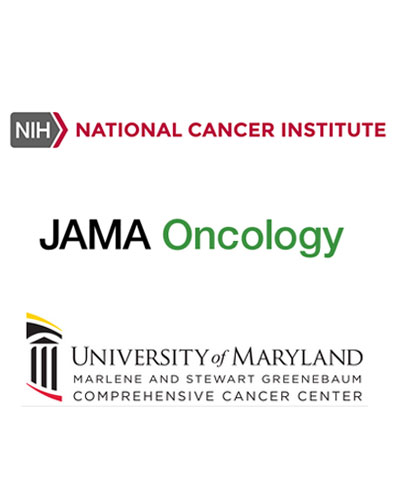August 07, 2017 | Larry Roberts

Results of Phase III Clinical Study Highlight Need for Predictive Biomarkers to Guide Treatment
Adding the targeted therapy cetuximab to chemotherapy and radiation treatment does not improve overall survival for patients with esophageal cancer, according to new research published online in JAMA Oncology.
More than 340 patients were enrolled in the National Cancer Institute-sponsored Phase III clinical study led by the Radiation Therapy Oncology Group (now NRG Oncology) from 2008 to 2013. A total of 328 patients from institutions across the country were evaluated. All of the patients received weekly doses of two chemotherapy drugs, paclitaxel and cisplatin, plus daily radiation treatments. About half of the patients also received cetuximab.
Cetuximab is a monoclonal antibody that inhibits a protein called epidermal growth factor receptor (EGFR). In esophageal and other cancers, the protein seems to encourage tumor growth. The drug has been approved to treat advanced head and neck cancer and metastatic colorectal cancer and is under investigation for several other cancers.
"Our findings are consistent with other Phase III studies that have failed to demonstrate an improvement in overall survival by adding an EGFR inhibitor to concurrent chemoradiation regimens for various solid tumors," says lead author Mohan Suntha, MD, MBA, the Marlene and Stewart Greenebaum professor of radiation oncology at the University of Maryland School of Medicine and president and chief executive officer of the University of Maryland Medical Center.
“Taken together, these trial results highlight the need to identify prognostic variables that may provide insight into which patient populations will benefit from EGFR inhibition,” says Dr. Suntha, adding that mutations in the p53 gene and KRAS protein may be key factors in determining who will benefit. Dr. Suntha, a radiation oncologist, treats patients at the University of Maryland Marlene and Stewart Greenebaum Comprehensive Cancer Center.
The median overall survival for the patients in the study who received cetuximab was 19.7 months, compared to 19 months for those who received chemoradiation alone. After two years, the patients in the experimental arm had an overall survival rate of 45 percent compared to a 44 percent survival rate for the control group. The survival rate after three years was similar for both groups – 34 percent for the cetuximab arm and 28 percent for the control group.
The response to treatment between the two groups was also about the same – 56 percent in the experimental arm initially had a complete response to the treatment, compared to 58 percent in the group that received only chemotherapy and radiation.
“Through their exhaustive research, Dr. Suntha and his colleagues were able to demonstrate that a targeted therapy once thought to be promising for esophageal cancer did not improve overall survival,” saysE. Albert Reece, MD, PhD, MBA, vice president for medical affairs at the University of Maryland, who is the John Z. and Akiko K. Bowers Distinguished Professor and dean of the School of Medicine. “Their analysis clearly underscores the need to learn more about the genetics of these tumors – and to identify possible new targets – in our search for more effective treatments for this challenging disease.”
About 20 percent of patients with esophageal cancer survive at least five years after diagnosis, although survival rates are higher if the cancer is diagnosed earlier. Nearly 17,000 new cases are diagnosed each year, and men and three to four times more likely to be diagnosed with this cancer. Many patients are diagnosed when their cancer is advanced and are not candidates for surgery.
About the University of Maryland School of Medicine
Commemorating its 210th Anniversary, the University of Maryland School of Medicine was chartered in 1807 as the first public medical school in the United States. It continues today as one of the fastest growing, top-tier biomedical research enterprises in the world -- with 43 academic departments, centers, institutes, and programs; and a faculty of more than 3,000 physicians, scientists, and allied health professionals, including members of the National Academy of Sciences, and a distinguished recipient of the Albert E. Lasker Award in Medical Research. With an operating budget of more than $1 billion, the School of Medicine works closely in partnership with the University of Maryland Medical Center and Medical System to provide research-intensive, academic and clinically-based care for more than 1.2 million patients each year. The School has over 2,500 students, residents, and fellows, and nearly $450 million in extramural funding, with more than half of its academic departments ranked in the top 20 among all public medical schools in the nation in research funding. As one of the seven professional schools that make up the University of Maryland, Baltimore campus, the School of Medicine has a total workforce of nearly 7,000 individuals. The combined School and Medical System (“University of Maryland Medicine”) has a total budget of $5 billion and an economic impact of nearly $15 billion on the state and local community. The School of Medicine faculty, which ranks as the 8th-highest public medical school in research productivity, is an innovator in translational medicine with 600 active patents and 24 start-up companies. The School works locally, nationally, and globally, with research and treatment facilities in 36 countries around the world. Visit medschool.umaryland.edu
About the University of Maryland Marlene and Stewart Greenebaum Comprehensive Cancer Center
The University of Maryland Marlene and Stewart Greenebaum Comprehensive Cancer Center is a National Cancer Institute-designated Comprehensive Cancer Center in Baltimore. The center is a joint entity of the University of Maryland Medical Center and University of Maryland School of Medicine. It offers a multidisciplinary approach to treating all types of cancer and has an active cancer research program. It is ranked in the top 25 cancer programs in the nation by U.S. News & World Report. www.umgccc.org.
Learn More
Contact
Department of Anesthesiology
(410) 328-6120 (phone)
(410) 328-5531 (fax)
swalsh@som.umaryland.edu
University of Maryland School of Medicine
Larry Roberts
Web Communications
410-706-4939
lroberts@som.umaryland.edu
Related stories

Tuesday, November 23, 2021
University of Maryland Medicine to Eliminate Race from Kidney Function Estimates
University of Maryland Medicine, comprised of the University of Maryland Medical System (UMMS) and the University of Maryland School of Medicine (UMSOM) has announced that it will end the use of a long-standing clinical standard that factors a patient’s race into the diagnosis of chronic kidney disease (CKD). The change could increase access to specialty care, including eligibility for kidney transplantation for thousands of African American people living with advanced kidney disease.

Thursday, March 23, 2017
University of Maryland Medical Center Midtown Campus Receives Regulatory Approval for New Ambulatory Care Center
University of Maryland, Baltimore (UMB) President Jay A. Perman, MD, along with the University of Maryland School of Medicine (UM SOM) Dean E. Albert Reece, MD, PhD, MBA, and the University of Maryland School of Nursing (SON) Dean Jane M. Kirschling, PhD, RN, FAAN, announced today that an alumni couple, Richard Sherman, MD, SOM ’72, and Jane Sherman, PhD, SON ’85, have made a $1.5 million gift to the University to establish a health care innovation center to be located in the Health Sciences & Human Services Library.

Thursday, May 19, 2016
Mohan Suntha, M.D., Named President and CEO of University of Maryland Medical Center
Mohan Suntha, M.D., a physician leader with more than 20 years of medical and administrative experience within the University of Maryland Medical System (UMMS), has been named President and Chief Executive Officer (CEO) of the University of Maryland Medical Center (UMMC) effective September 1, 2016.
